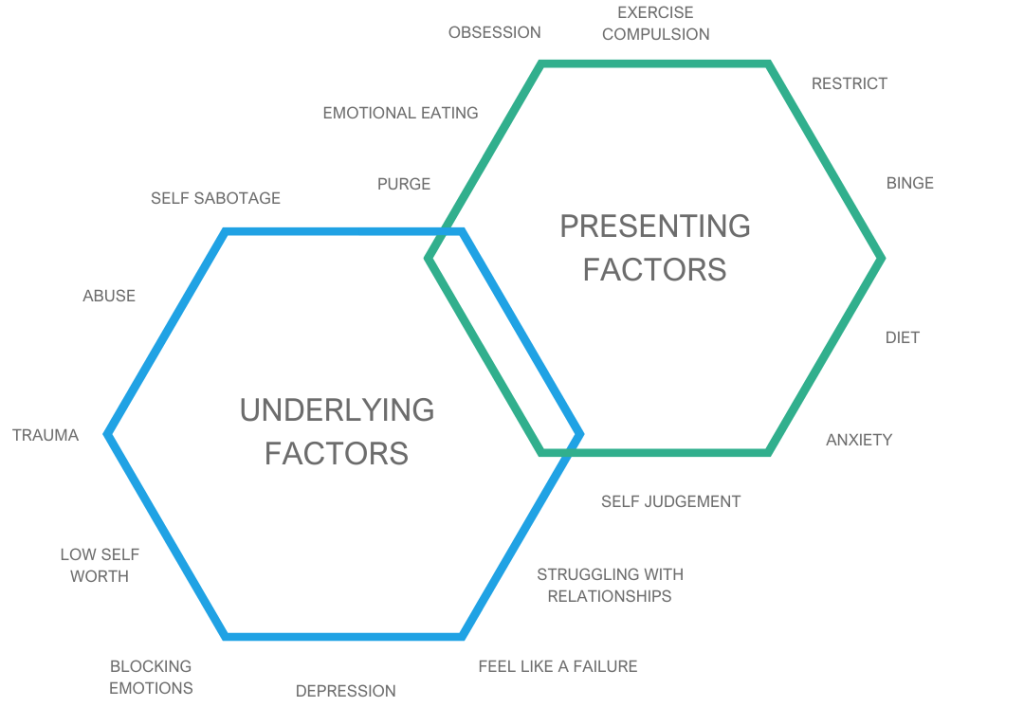Binge Eating Disorder Treatment
Binge Eating Disorder (BED)
People who eat in secret, eat until they are uncomfortably full, and feel a sense of shame after eating, may be struggling with Binge Eating Disorder (BED).
BED is diagnosed when a person participates in a minimum of two binge-eating episodes per week for six months, where a considerably large amount of food is consumed in a short timeframe (e.g. 2 hours). These episodes are accompanied by a feeling of ‘loss of control’ over what, and how much, is consumed.
There are many biological and lifestyle factors that can drive a desire to overeat, however, when unhelpful thinking is activated this can develop into compulsive overeating.
Some people use binge eating as a way of coping with difficult emotions, and over time feel unable to break free from complex patterns of thoughts, emotions and behaviours.
Most often, people with binge eating disorder struggle with their weight. You may follow a binge eating episode with restrictive dieting for several days to make up for the excess calories consumed.
This may create intense cravings for sugar and a physiological drive to eat, setting you up for another binge episode. With your physiology and emotions in chaos, it is easy to feel trapped in what feels like a constant binge eating cycle.
James Lamper and his team of bariatric psychotherapists specialise in the treatment of binge eating. They work alongside our nutrition team in our non-surgical weight loss programme called Reframe.

HealthMatters Group CEO James Lamper describes how Binge Eating Disorder Treatment can support you in changing your relationship with your weight and body.
Let us Explain how we can help you
Speak with our friendly patient concierge team, and let us answer any questions you have about weight loss surgery
BINGE EATING DISORDER & WEIGHT LOSS SURGERY
Obesity is a common physical result of binge eating and compulsive overeating.
Binge eating is the most common disordered eating presentation seen in patients seeking weight loss surgery.
Weight loss surgery is a successful intervention to treat excessive weight gain and obesity that results from binge eating.
The most common weight loss surgeries performed are the Gastric Sleeve, Gastric Bypass, Mini Gastric Bypass and Gastric Band.
Bariatric surgery limits the amount of food a person can consume by creating a smaller gastric pouch, and in some cases affecting the absorption of food that is consumed. This reduces the volume of food an individual can consume at a meal, and increases the feeling of fullness and satiety.
Bariatric surgery may physically restrict the patient from consuming the same high volumes of food during a bingeing episode as before. This in turn can promote gradual weight loss and reduce the desire for bingeing episodes.
It is important you are honest with your surgeon and wider MDT. We are here to support you in achieving the best outcomes from your weight loss surgery.
Most people just require a few extra psychotherapy sessions to address their conflated relationship between emotions and food before their scheduled surgery date.
BINGE EATING DISORDER TREATMENT
The presence of binge eating pre-surgery is likely to interfere with surgery outcomes, leading to less weight loss, potentially after time weight rebound and weight gain, and in some cases worsen the eating disorder symptoms, if left untreated.
Our experienced therapy team will evaluate your eating behaviour during our psychological assessment, and help you manage your binge eating behaviour pre-op. We will show you how to best manage your emotions and stress without using food to soothe yourself.
The focus of binge eating treatment is to discover which triggers cause you to binge eat, to help you build new ways of coping with the stress / emotions these events bring, and help you develop new thinking styles to deal with life in a positive and empowering way.
Binge eating disorder treatment may include:
- Keep a food diary of what you are eating, when, where and why – so we can explore when healthy eating moves into emotional eating
- Recognise emotional eating triggers and find alternative ways to cope with the emotions
- Identify thoughts, beliefs and assumptions that are keeping you stuck in your binge eating cycle, and learn skills to challenge them
- Learn new skills to manage emotional, relationship, situational and environmental triggers and challenge old habits of using binge eating as a consistent, coping strategy for challenging life events and negative emotions
- Build greater levels of self-esteem and self-worth as you start to change the deep beliefs that shape your self-concept of who you are
- Work through barriers to healthy eating such as stress, anxiety, complicated food environments, time management, regular exercise, social eating and competitive work environments
- Cultivate a healthy body image
- Build greater levels of self-esteem and self-worth as you start to change the deep beliefs that shape your self-concept of who you are
- Support in helping you assess and understand dietary and nutritional needs
- Nutritional Interventions to help you eat a balanced diet to reduce cravings and improve physiology
- Learn how to listen to your body for hunger, emotional and satiety cues
We believe binge eating disorder treatment needs to look at your nutrition, behaviour, thinking and emotions. Our expertise lies in providing you with the interventions and supporting you in developing the mindset that will help you feel in control of your eating, so you can experience the best outcomes from your weight loss surgery.

